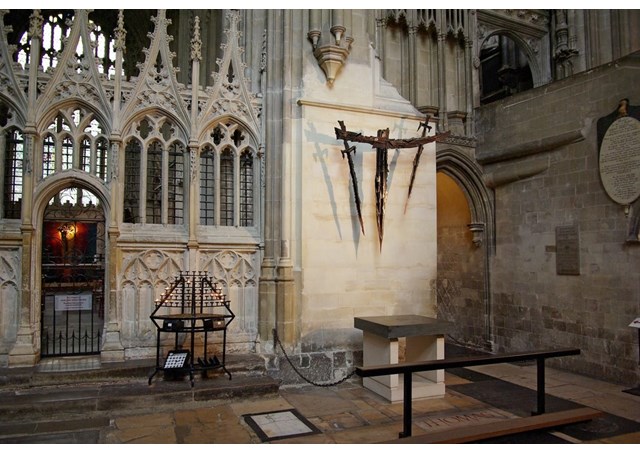
Anglicans, Catholics welcome return of Thomas Becket relics

(Vatican Radio) A relic of St Thomas Becket, the 12th century English archbishop murdered at the altar in Canterbury Cathedral, is returning home this week from Hungary, where it has been venerated as a powerful symbol of the Church’s struggle for religious freedom.
The relic, a small fragment of bone, is believed to have been taken to Hungary shortly after the assassination and has been kept for the past eight centuries in Esztergom Basilica. Becket’s murder by four knights in December 1170 marked the dramatic end of a long feud with King Henry II and the start of a popular tradition of pilgrimage to his tomb.
Under Henry VIII, his shrine was destroyed and his name was removed from the Church of England calendar, yet today he is being seen a sign of shared Christian heritage and a powerful symbol of those modern martyrs being persecuted for their faith.
Hungary’s president will join top Catholic and Anglican leaders for liturgies at both Westminster Cathedral and Westminster Abbey, before the relic continues its journey to Canterbury Cathedral.
Cardinal Vincent Nichols is presiding at Mass to welcome the relics to Westminster Cathedral – he talked to Philippa Hitchen about this unprecedented ecumenical initiative...
Cardinal Nichols says the initiative comes from Hungarian Cardinal Erdo and the Hungarian government, since these relics have been there, almost since Becket’s death, and have been an important focal point for Catholic life, especially during the period of Communist domination.
The cardinal notes that Becket stood firmly for the rights of the Church and particularly of the clergy in the tussle that was going on in juridical matters between Church and State. Later, during the Reformation when Henry XIII wanted to obliterate the feast and the memory of Becket, Catholic priests coming to England and risking their lives appealed to Becket as their patron.
New ecumenical era
In this new ecumenical era, Cardinal Nichols says the devotion to Becket has grown as people see in his life a “total dedication to the ministry of being a priest, and in his case a bishop, which inspires every priest today”.
Following the liturgies in Westminster Cathedral and Westminster Abbey, the relics will go at the end of the week to Canterbury and be received in the Cathedral, following a precession through the city centre. The Cardinal says this event was “prefigured in a way by the visit of John Paul II” who knelt together in prayer with the then Archbishop of Canterbury, Robert Runcie, at the spot where Becket was martyred. That encounter, he says, was the “beginning of an important healing and moving forward to a time of sharing and esteem” for those who were heroic in their faith.
Becket's European legacy
Cardinal Nichols also notes that veneration for Becket spread right across Europe in the years after his death as many people came to visit the site of his murder. Today, he adds, as the practice of pilgrimages is once again on the rise, Pope Francis is urging us to see our own lives as a pilgrimage, especially during this Year of Mercy.
| All the contents on this site are copyrighted ©. |


